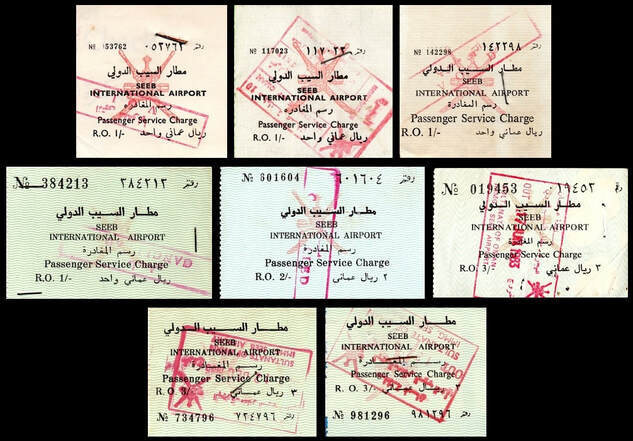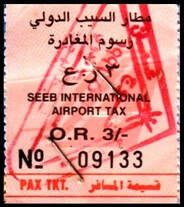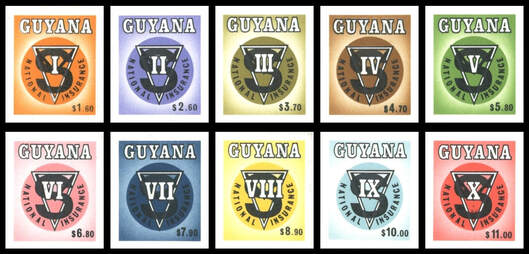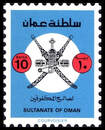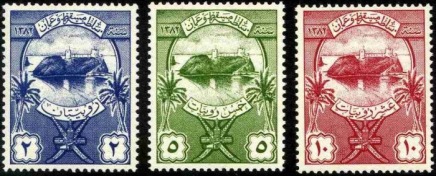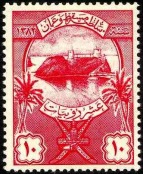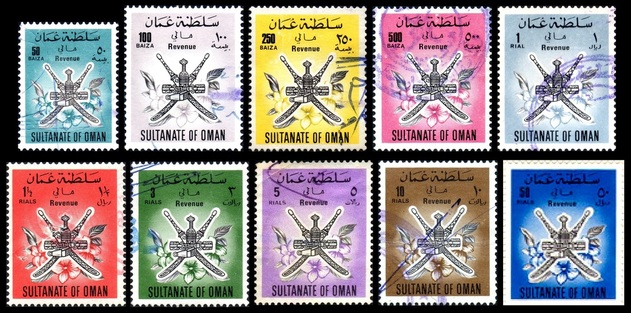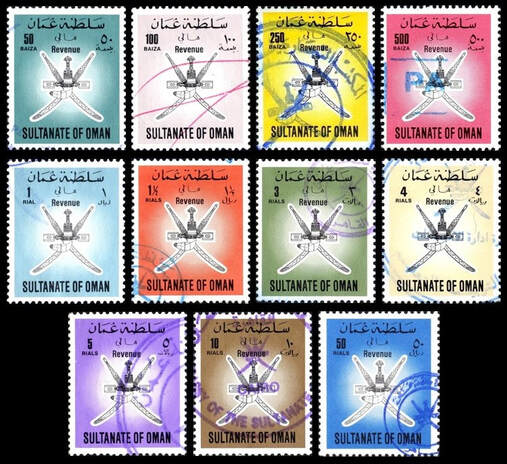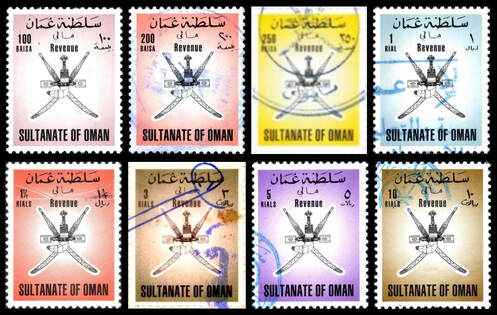Oman
On this page are listed revenue stamps inscribed with the following territorial names:
- State of Muscat and Oman (c1930)
- Sultanate of Muscat and Oman (c1945)
- Sultanate of Oman (1970 to present)
Chapter overview
- Airport Passenger Service Charge (catalogue numbers prefixed A)
- Excise (catalogue numbers prefixed X)
- Labels (catalogue numbers prefixed L)
- Revenue (catalogue numbers prefixed R)
Currency
- (1930) 16 annas = 1 rupee
- (1970) 100 baiza = 1 rial
Acknowledgments
Grateful thanks to Cal Allen and Thomas Johansen for generously allowing me to incorporate the fruits of their research into Oman revenues. Thanks also to Carmel Axiaq for providing printing details of the elusive first issue (R1/4).
Airport Passenger Service Charge
1974-86 (recorded usage). Issue for Seeb Airport, Muscat. National emblem (sheathed khanjar and crossed swords) in rose, faint on A11/22. Inscribed Seeb International Airport Passenger Service Charge, with currency shown as R.O. (=Rial Omani). Imperf three sides, perforated at left. No watermark. Serial number in both Western and Arabic numerals.
a) Approx 55 x 60 mm, security number at top, plain background (recorded usage 1974-75)
A1. 1r black (sans-serif inscriptions, wove paper)
A2. 1r black (sans-serif inscriptions, laid paper)
A3. 1r black (seriffed inscriptions, laid paper)
b) 75-80 x 50 mm, security number at top, background of wavy lines in green (recorded usage 1977-83)
A11. 1r black
A12. 2r black
A13. 3r black
c) 60-65 x 50 mm, similar to A11/13 but security number at foot (recorded usage 1985-86)
A21. 3r black (Passenger Service Charge 48 mm across)
A22. 3r black (Passenger Service Charge 39 mm across)
Recorded usage:
a) Approx 55 x 60 mm, security number at top, plain background (recorded usage 1974-75)
A1. 1r black (sans-serif inscriptions, wove paper)
A2. 1r black (sans-serif inscriptions, laid paper)
A3. 1r black (seriffed inscriptions, laid paper)
b) 75-80 x 50 mm, security number at top, background of wavy lines in green (recorded usage 1977-83)
A11. 1r black
A12. 2r black
A13. 3r black
c) 60-65 x 50 mm, similar to A11/13 but security number at foot (recorded usage 1985-86)
A21. 3r black (Passenger Service Charge 48 mm across)
A22. 3r black (Passenger Service Charge 39 mm across)
Recorded usage:
- A1 July 1974, A2 June 1975, A3 September 1975
- A11 October 1977, A12 October 1981, A13 June 1983
- A21 December 1985, A22 August 1986
1996 (recorded usage). New type inscribed Seeb International Airport Tax, Pax Tkt. Imperf x perf 10. No watermark. Serial number in Western numerals at foot. Security background of wavy lines in pink.
A31. 3r black and red
A31. 3r black and red
Excise
2020s. 44 x 20 mm. Self-adhesive design featuring sailing ship. For excise on cigarettes. Imperf. No wmk. 13-digit security number at foot prefixed by the letters OMS, and QR code at left. Background inscription ...OMANOMANOMANO... etc in tiny letters. Inscriptions in black, central security pattern in green and red-brown.
X1. [No value indicated] blue-green
X1. [No value indicated] blue-green
Labels
1985 (recorded usage). 17½ x 22½ mm. National emblem (sheathed khanjar and crossed swords). Inscribed لصالح المكفوفين (=for the benefit of blind people) in Arabic only. Perf 12 x 11½. No watermark. Printed by Courvoisier with imprint at foot.
L1. 10b black, blue and red
L1. 10b black, blue and red
Revenue
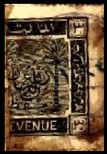
Unidentified value
c1930. Palm trees surrounding Arabic inscription State of Muscat and Oman, with Revenue in Arabic at top and in English at foot. 37 x 36½ mm. Perf 11, one or two sides sometimes imperf. No watermark.
R1. 8a blue-green
R2. 1r carmine
R3. 5r blue
R4. 10r scarlet
R1. 8a blue-green
R2. 1r carmine
R3. 5r blue
R4. 10r scarlet
Note: R1/4 were originally discovered in a private document archive belonging to a family in Oman, though a handful of other examples have surfaced in recent years. A fifth value in black (illustrated at right) has also been recorded, though the image is insufficiently clear to confirm the value, which might be 3 rupees or 30 baiza (=2½ annas).
_c1945 (based on Arabic inscription 1365 AH, which equates
to 1945-46 AD). Fort Al Jalali, Muscat. Inscribed Sultanate of Muscat and Oman in upper central banner. 17½ x 22 mm (2a and 1r) or 24 x 30½ mm (5r and 20r). Perf 11. No
watermark.
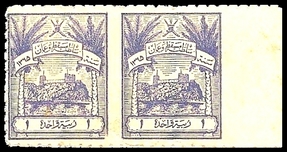 R13a
R13a
[R11. 2a red-brown]
R13. 1r blue
a. Imperf between (vertically)
b. Perf 12
[R14. 5r green]
R16. 20r carmine
Notes:
1. The 2 anna (which is inscribed one-eighth rupee) and 5 rupee values are currently known only as imperforate proofs in complete sheets (of 20 and 16 respectively), and it is not known whether they were ever issued.
2. The example of R13a illustrated above right is also imperforate between the right-hand stamp and the margin.
R13. 1r blue
a. Imperf between (vertically)
b. Perf 12
[R14. 5r green]
R16. 20r carmine
Notes:
1. The 2 anna (which is inscribed one-eighth rupee) and 5 rupee values are currently known only as imperforate proofs in complete sheets (of 20 and 16 respectively), and it is not known whether they were ever issued.
2. The example of R13a illustrated above right is also imperforate between the right-hand stamp and the margin.
Note: the stamps illustrated above are a previously unrecorded type printed by Waterlow & Sons in sheets of 100 (10 rows of 10). The design includes the Omani coat of arms at bottom left, and is inscribed at foot with the name Dhofar, a region of Oman which at certain periods of history was governed as a separate political entity. The stamps shown are denominated ½r, 1r, 2r, 3r and 5r, the currency being in rials. I do not know whether these stamps were ever issued, and would be glad to hear from any reader who can supply any further information about these stamps. I am grateful to John Copeland for sending me the above images.
c1962 (based on Arabic inscription 1382 AH = 1962-63 AD). Fort Al Jalali, Muscat.
23½ x 30 mm. Perf 13½ x 13. No watermark.
R21. 2r slate-blue
R22. 5r green
R23. 10r red-brown
R26. 10r scarlet
Note: according to Barefoot, R21/23 were issued in 1962, with R26 added in 1963.
23½ x 30 mm. Perf 13½ x 13. No watermark.
R21. 2r slate-blue
R22. 5r green
R23. 10r red-brown
R26. 10r scarlet
Note: according to Barefoot, R21/23 were issued in 1962, with R26 added in 1963.
1972-74. Arms of the Sultanate on a floral background, inscribed Sultanate of Oman in English and Arabic. 19 x 25 mm (50b) or 23 x 28 mm (others). Perf 14½. Wmk spiral crown CA (sideways on 100b and above). Printed (litho) by Harrisons in sheets of 50. Arms and inscriptions in black; background colours given below.
R34. 50b grey-blue
R35. 100b pale greyish lilac
R37. 250b deep yellow
R38. 500b dull pink
R39. 1r blue-grey
R40. 1½r red
R41. 3r deep green
R42. 5r violet
R43. 10r brown
R44. 50r deep blue
Notes:
1. The dates of issue are known from the sets of proofs which are housed in the British Library. The first issue consisted of the set to the 1r. This was approved in May 1972, and would have been issued later that year. A new printing of four additional values (1½r, 3r, 10r and 50r) was approved in October 1974, and probably came out by the end of 1974. The date of issue of the 5r is not known. The proofs also show Harrisons as the printers and a sheet size of 50, though the format is not known.
2. The British Library material shows that the original (1972) issue also included the 5b magenta, 10b pale mauve, 25b greenish yellow in small format and the 200b apple-green in larger format. I have not seen issued examples of these stamps but it is very likely they exist. Numbers have been set aside in this listing for their future addition.
3. Barefoot lists a 4r yellow. I have not seen this value from this series though it may be an erroneous listing for my R58 below.
4. Recorded printings (this list is assumed to be incomplete):
R34. 50b grey-blue
R35. 100b pale greyish lilac
R37. 250b deep yellow
R38. 500b dull pink
R39. 1r blue-grey
R40. 1½r red
R41. 3r deep green
R42. 5r violet
R43. 10r brown
R44. 50r deep blue
Notes:
1. The dates of issue are known from the sets of proofs which are housed in the British Library. The first issue consisted of the set to the 1r. This was approved in May 1972, and would have been issued later that year. A new printing of four additional values (1½r, 3r, 10r and 50r) was approved in October 1974, and probably came out by the end of 1974. The date of issue of the 5r is not known. The proofs also show Harrisons as the printers and a sheet size of 50, though the format is not known.
2. The British Library material shows that the original (1972) issue also included the 5b magenta, 10b pale mauve, 25b greenish yellow in small format and the 200b apple-green in larger format. I have not seen issued examples of these stamps but it is very likely they exist. Numbers have been set aside in this listing for their future addition.
3. Barefoot lists a 4r yellow. I have not seen this value from this series though it may be an erroneous listing for my R58 below.
4. Recorded printings (this list is assumed to be incomplete):
- Req H1/OMAN GOVT 4/15758/1 (date unknown, probably late 1974): 1½r, 3r, 10r, 50r
- Req (reference number and date unknown): 500b, 1r
- Req PH1/OMAN GOVT 8/17687/1 (delivery date 5th January 1979): 250b, 1r
- Req PH1Y/OMAN GOVT 9/12016 (date unknown, probably c1979): 1r
- Req PH1/OMAN GOVT 0/03401 (date unknown, probably c1980): 500b
- Req PH1V/OMAN GOVT 0/11878/1 (date unknown, probably c1980): 1r
1989 (according to Barefoot). Similar to previous issue but redrawn with Revenue in slightly taller letters, and without the floral background. All values 22½ x 28 mm (no smaller format for low values). Perf 14¼. No wmk. Printed by BDT International (imprint in lower margin). Arms and inscriptions in black; background colours given below.
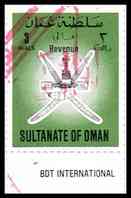 3r marginal with printer's imprint
3r marginal with printer's imprint
R51. 50b grey-blue
R52. 100b pale greyish lilac
R53. 250b deep yellow
R54. 500b dull rose
R55. 1r blue-grey
R56. 1½r red
R57. 3r deep green
R58. 4r pale buff
R59. 5r violet
R60. 10r brown
R61. 50r deep blue
R52. 100b pale greyish lilac
R53. 250b deep yellow
R54. 500b dull rose
R55. 1r blue-grey
R56. 1½r red
R57. 3r deep green
R58. 4r pale buff
R59. 5r violet
R60. 10r brown
R61. 50r deep blue
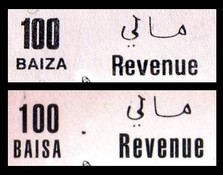 1989 issue (top) and 1998 issue with tall thin letters
1989 issue (top) and 1998 issue with tall thin letters
1998 (earliest recorded usage). Design again redrawn, with the English inscriptions at top in taller thinner letters as illustrated at right. Perf 13. No wmk. Arms and inscriptions in black; background colours given below.
Two different sizes:
a) Smaller format (21½ x 28 mm)
R71. 100b pale greyish lilac
R72. 200b salmon
R73. 250b yellow
R74. 1r blue-grey
R75. 1½r scarlet
R76. 3r olive
R77. 5r violet
R78. 10r brown
R71. 100b pale greyish lilac
R72. 200b salmon
R73. 250b yellow
R74. 1r blue-grey
R75. 1½r scarlet
R76. 3r olive
R77. 5r violet
R78. 10r brown
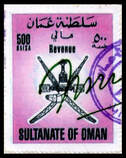 R84 forgery
R84 forgery
b) Larger format (22½ x 29 mm)
R83. 250b yellow
R84. 500b claret
R86. 3r olive
R87. 5r violet
R88. 10r brown
Notes:
1. The unit of currency on R71/72 and R83/84 is now correctly shown in English as baisa, not baiza as on the previous two issues.
2. Earliest recorded usage (smaller format): 1998 (100b), 2000 (200b, 5r). The document illustrated below shows a receipt for 200b fees paid in three stages on 22nd February, 8th March and 22nd March 1998. The first two payments use stamps of the previous series (my R51/2), while the third shows the earliest usage of R71. From this I infer that R71 - and possibly other values of this set - were issued in mid-March 1998.
3. Earliest recorded usage (larger format): September 2011 (5r).
4. Illustrated here is a crudely printed forgery of R84. This was evidently intended to defraud the authorities and was successfully used to pay duty on an examination certificate.
R83. 250b yellow
R84. 500b claret
R86. 3r olive
R87. 5r violet
R88. 10r brown
Notes:
1. The unit of currency on R71/72 and R83/84 is now correctly shown in English as baisa, not baiza as on the previous two issues.
2. Earliest recorded usage (smaller format): 1998 (100b), 2000 (200b, 5r). The document illustrated below shows a receipt for 200b fees paid in three stages on 22nd February, 8th March and 22nd March 1998. The first two payments use stamps of the previous series (my R51/2), while the third shows the earliest usage of R71. From this I infer that R71 - and possibly other values of this set - were issued in mid-March 1998.
3. Earliest recorded usage (larger format): September 2011 (5r).
4. Illustrated here is a crudely printed forgery of R84. This was evidently intended to defraud the authorities and was successfully used to pay duty on an examination certificate.
